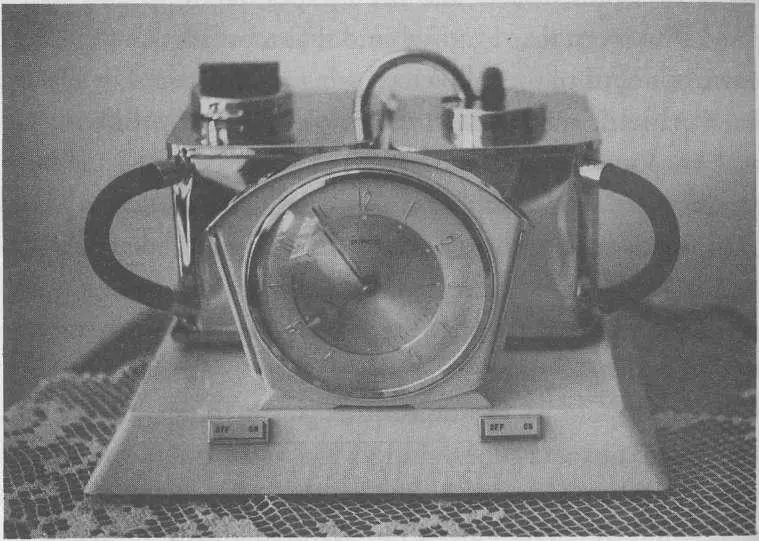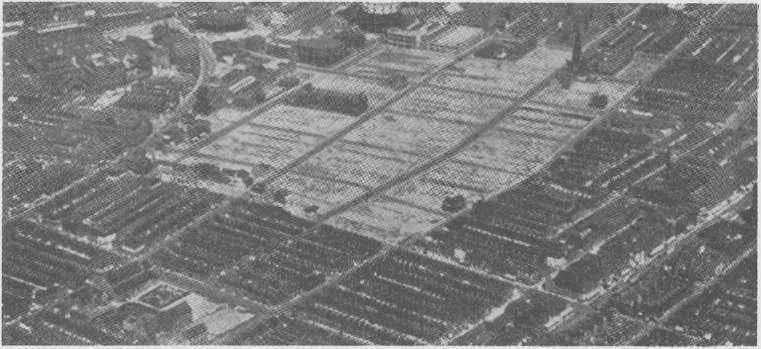The day of my arrival at the Arosa, like most of the days, weeks and months to come, was a time of remarkable silence and emptiness. I spent the morning unpacking my suitcase and bags, stowing away my clothing and linen, and arranging my writing materials and other belongings; then, tired after a night of travelling, I fell asleep on my iron bed, my face buried in the candlewick bedspread, which smelled faintly of violet-scented soap. I did not come to till almost half past three, when Mrs Irlam knocked at my door. Apparently by way of a special welcome, she brought me, on a silver tray, an electric appliance of a kind I had never seen before. She explained that it was called a teas-maid, and was both an alarm clock and a tea-making machine. When I made tea and the

steam rose from it, the shiny stainless steel contraption on its ivory-coloured metal base looked like a miniature power plant, and the dial of the clock, as I soon found as dusk fell, glowed a phosphorescent lime green that I was familiar with from childhood and which I had always felt afforded me an unaccountable protection at night. That may be why it has often seemed, when I have thought back to those early days in Manchester, as if the tea maker brought to my room by Mrs Irlam, by Gracie — you must call me Gracie, she said — as if it was that weird and serviceable gadget, with its nocturnal glow, its muted morning bubbling, and its mere presence by day, that kept me holding on to life at a time when I felt a deep sense of isolation, in which I might well have become completely submerged. Very useful, these are, said Gracie as she showed me how to operate the teas-maid that November afternoon; and she was right. After my initiation into the mysteries of what Gracie called an electrical miracle, we went on talking in a friendly fashion, and she repeatedly emphasized that her hotel was a quiet establishment, even if sometimes in the evenings there was (as she put it) a certain commotion. But that need not concern you. It's travelling gentlemen that come and go. And indeed, it was not until after office hours that the doors would open and the stairs creak at the Hotel Arosa, and one would encounter the gentlemen Gracie had referred to, bustling characters clad almost without exception in tattered gabardine coats or macs. Not until nearly eleven at night did the toings and froings cease and the garish women disappear — whom Gracie would refer to, without the slightest hint of irony, with a hold-all phrase she had evidently coined herself, as the gentlemen's travelling companions.
Every evening of the week, the Arosa was bustling with salesmen and clerks, but on Saturday evening, as in the entire rest of the city centre, there was no sign of life. Interrupted only occasionally by stray customers she called irregulars, Gracie would sit at the roll-top desk in her office doing the books. She did her best to smooth out the grey-green pound notes and brick-red ten-shilling notes, then laid them carefully in piles, and, whispering as if at some mystical rite, counted them until she had come up with the same total at least twice. She dealt with the coins no less meticulously; there Was always a considerable quantity, and she stacked them in evencolumns of copper, brass and silver before she set about calculating the total, which she did partly by manual and partly by mathematical means, first converting the pennies, threepenny bits and sixpences to shillings and then the shillings, florins and half crowns into pounds. The final conversion that then followed, of the pound total thus arrived at into the guineas which were at that time still the customary unit in better business establishments, always proved the most difficult part of this financial operation, but without a doubt it was also its crowning glory. Gracie would enter the sum in guineas in her ledger, sign and date it, and stow the money in a Pickley & Patricroft safe that was built into the wall by the desk. On Sundays, she would invariably leave the house early in the morning, carrying a small patent leather case, only to return, just as unfailingly, at lunchtime on the Monday.
As for myself, on those Sundays in the utterly deserted hotel I would regularly be overcome by such a sense of aimlessness and futility that I would go out, purely in order to preserve an illusion of purpose, and walk about amidst the city's immense and time-blackened nineteenth-century buildings, with no particular destination in mind. On those wanderings, when winter light flooded the deserted streets and squares for the few rare hours of real daylight, I never ceased to be amazed by the completeness with which anthracite-coloured Manchester, the city from which industrialization had spread across the entire world, displayed the clearly chronic process of its impoverishment and degradation to anyone who cared to see. Even the grandest of the buildings, such as the Royal Exchange, the Refuge Assurance Company, the Grosvenor Picture Palace, and indeed the Piccadilly Plaza, which had been built only a few years before, seemed so empty and abandoned that one might have supposed oneself surrounded by mysterious fa$ades or theatrical backdrops. Everything then would appear utterly unreal to me, on those sombre December days when dusk was already falling at three o'clock, when the starlings, which I had previously imagined to be migratory songbirds, descended upon the city in dark flocks that must have numbered hundreds of thousands, and, shrieking incessantly, settled close together on the ledges and copings of warehouses for the night.
Little by little my Sunday walks would take me beyond the city centre to districts in the immediate neighbourhood, such as the one-time Jewish quarter around the star-shaped complex of Strangeways prison, behind Victoria Station. This quarter had been a centre for Manchester's large Jewish community until the inter-war years, but those who lived there had moved into the suburbs and the district had meanwhile been demolished by order of the municipality. All I found still standing was one single row of empty houses, the wind blowing through the smashed windows and doors; and, by way of a sign that someone really had once been there, the barely decipherable brass plate of a one-time lawyers' office, bearing names that had a legendary ring to my ear: Glickmann, Grunwald and Gottgetreu. In Ardwick, Brunswick, All Saints, Hulme and Angel Fields too, districts adjoining the centre to the south, whole square kilometres of working-class homes had been pulled down by the authorities, so that, once the demolition rubble had been removed, all that was left to recall the lives of thousands of people was the grid-like layout of the streets. When night fell upon those vast spaces, which I came to think of as the Elysian Fields, fires would begin to flicker here and there and children would

stand around them or skip about, restless shadowy figures. On that bare terrain, which was like a glacis around the heart of the city, it was in fact always and only children that one encountered. They strayed in small groups, in gangs, or quite alone, as if they had nowhere that they could call home. I remember, for instance, late one November afternoon, when the white mist was already rising from the ground, coming across a little boy at a crossroads in the midst of the Angel Fields wasteland, with a Guy stuffed with old rags on a handcart: the only person out and about in the whole area, wanting a penny for his silent companion.
It was early the following year, if I remember correctly, that I ventured further out of the city, in a southwesterly direction, beyond St George and Ordsall, along the bank of the canal across which, from my window, I could see the Great Northern Railway Company depot. It was a bright, radiant day, and the water, a gleaming black in its embankment of massive masonry blocks, reflected the white clouds that scudded across the sky. It was so strangely silent that (as I now think I remember) I could hear sighs in the abandoned depots and warehouses, and was frightened to death when a number of seagulls, squawking stridently, all of a sudden flew
Читать дальше














